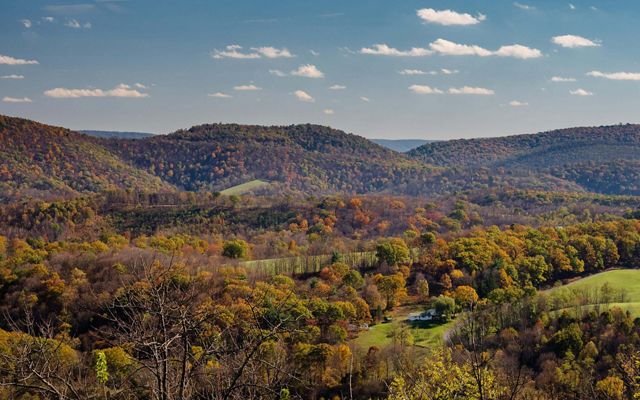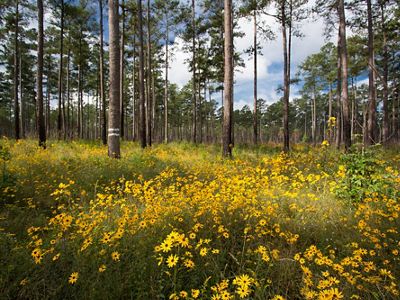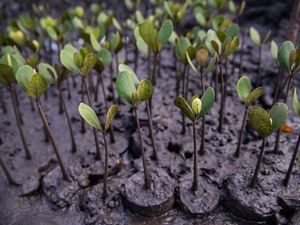TNC to Receive $200 Million from EPA’s Climate Pollution Reduction Grant Program, Part of Historic $421 Million Multi-State Coalition Grant
Media Contacts
-
Debbie Crane
The Nature Conservancy
Phone: (919) 619-8613
Email: dcrane@tnc.org
The Nature Conservancy (TNC) today announced that it will receive $200 million toward nature-based solutions, supporting significant reductions of carbon emissions across four states: Maryland, North Carolina, South Carolina and Virginia. Projects will focus on improved forest management, peatland restoration and tidal wetland enhancement, which are three areas identified as having the highest potential greenhouse gas benefits.
This grant is part of a historic $421 million award from the Environmental Protection Agency’s (EPA) Climate Pollution Reduction Grant (CPRG) Program—established as part of the Inflation Reduction Act in 2022—that will fund both state-led and TNC-led projects. Maryland, North Carolina, South Carolina, Virginia and TNC Chapters within those states joined together in forming the Atlantic Conservation Coalition to apply for the funding package, which now stands as the largest-ever on record for natural climate solutions.
“I am thrilled that The Nature Conservancy will be part of the largest-ever EPA award for community-driven natural climate solutions,” said Jennifer Morris, CEO of The Nature Conservancy. “This $200 million grant will enable TNC to increase carbon reduction efforts in the Appalachians, an area that our research has identified as a globally significant biodiversity hotspot. The forests, peatlands and wetlands across Maryland, North Carolina, South Carolina and Virginia have incredible power to sequester carbon, as well as support the life and livelihoods of the people who live there."
Altogether, the joint application is expected to reduce greenhouse gas emissions by an estimated 28 million metric tons CO2e by 2050. At a minimum, that is equivalent to taking more than 6.67 million gas-powered vehicles off the road each year. Between January 2025 and January 2030, TNC chapters will receive funding toward the following projects:
TNC Maryland: Will receive $42.5 million to support land protection and improve forest management across 28,897 acres of forest in the Appalachian Mountain range.
TNC North Carolina: Will receive $67.8 million to restore and protect peatlands, which will result in significant carbon dioxide emissions reductions. The minimum estimated annual reduction is equivalent to emissions produced by 57,120 cars a year. The maximum reduction is equivalent to that produced by 1.4 million cars a year.
TNC South Carolina: Will receive $39 million to conserve 25,000 acres of riverine bottomland hardwood forest on South Carolina’s coastal plain.
TNC Virginia: Will receive $47.2 million to conserve forests and improve forest management across the Appalachians and Southeastern Virginia, as well as restore tidal wetlands in Eastern Virginia, all of which will involve collaborating across state borders to maximize the climate benefits.
“We are looking forward to further collaboration with the Commonwealth of Virginia and the states of North Carolina, South Carolina and Maryland to bring natural climate solutions to the challenges we are all facing,” said Bettina Ring, Executive Director of TNC’s Virginia Chapter. “At TNC, we recognize the numerous environmental, economic and community benefits our natural resources can provide if we support their resiliency and sustain them for future generations. Being awarded one of the largest grants in the history of the EPA demonstrates that the agency also recognizes our natural resources are vital to mitigating climate change."
“This is a game changer in our work to reduce carbon emissions. Restored peatlands also have other benefits including absorbing floodwaters, improving wildlife habitat, and reducing wildfire risk,” said Katherine Skinner, Executive Director of TNC’s North Carolina Chapter. “The work will also serve as a model for global efforts to reduce carbon dioxide emissions. Peatlands are often overlooked and undervalued. But they are over-achievers when it comes to reducing carbon emissions. They cover three percent of the Earth but store 42 percent of all soil carbon.”
“The Appalachian forests are one of our region’s most precious natural resources thanks to the many benefits they provide, including their ability to capture carbon,” said Bob Allen, Deputy Executive Director of TNC’s Maryland and DC Chapter. “This historic grant from the EPA recognizes the critical role they play in removing emissions and will help to further unlock their potential as a natural climate solution. Just as importantly, this will also help ensure that our forests remain healthy, resilient, and able to further benefit future generations.”
While TNC has been active in these kinds of projects for decades, this new funding will enable activities to scale-up to improve forest management across an additional 67,650 acres of the Appalachians and 25,450 acres of longleaf pine ecosystem, restore 33,000 acres of peatlands and protect an additional 10,500 acres, and restore 150 acres of tidal wetlands. Along with their carbon sequestration benefits, these projects will help lower risks from wildfire and flooding for nature and local communities and bring TNC closer to achieving its 2030 goals. Collaboration with local, state, federal, tribal and nonprofit partners will ensure that related work both within and beyond the bounds of the grant are complementary to our work.
“In TNC’s 55 years of conserving South Carolina, we’ve seen how our forests can shelter wildlife, protect against flooding, keep our drinking water clean and offer opportunities to get outside,” said Dale Threatt-Taylor, Executive Director of TNC's South Carolina Chapter. “With this investment, these incredible resources have the potential to do even more. The same natural features that make South Carolina a wonderful place to live also can store carbon and lessen climate impacts.”
TNC’s initiatives, in addition to the state-led projects—such as coastal habitat restoration, planting trees in cities, conserving farmland, preserving land for outdoor recreation, and forest restoration—are expected to have expansive and long-lasting benefits to our climate and communities. When complete, these efforts will result in sequestering between 200,054 and 507,871 metric tons of carbon dioxide annually through 2050.
State-specific media contacts:
- Maryland: Matthew Kane, matthew.kane@tnc.org
- North Carolina: Debbie Crane, dcrane@tnc.org
- South Carolina: Cara Chancellor, cchancellor@tnc.org
- Virginia: Chelsea Bowers, chelsea.bowers@tnc.org
The Nature Conservancy is a global conservation organization dedicated to conserving the lands and waters on which all life depends. Guided by science, we create innovative, on-the-ground solutions to our world’s toughest challenges so that nature and people can thrive together. We are tackling climate change, conserving lands, waters and oceans at an unprecedented scale, providing food and water sustainably and helping make cities more sustainable. The Nature Conservancy is working to make a lasting difference around the world in 81 countries and territories (40 by direct conservation impact and 41 through partners) through a collaborative approach that engages local communities, governments, the private sector, and other partners. To learn more, visit nature.org or follow @nature_press on X.









